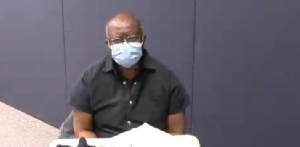A Tribute To Komla Dumor: When The Peals Fail
By Dr. F. R. Silverson
Cataract of Emotions
Having been sucked into a vortex of sadness since Saturday, I am gravid with pain and perhaps by inditing this piece, I may yet lessen the preponderant funereal and lugubrious grip of such emotions holding sway. Death is not only cruel, it is much more.
It cuts and thwarts; yes, it triturates roseate dreams into much less than noisome rubbles. It is that which slices through even the most hardened heart and subjugates it with hoops of steel without recourse to feelings of consolation.
When such a beautiful flower blossoming into something of splendiferous beauty, value, and service is severed from its branch posthaste and without notice, it must surely be decried and lamented.
Komla Dumor, although not known personally by as many as knew him, seem to have had a relationship with all. Yes, it seems like all those who either listened to him or watched him, had a connection of sorts with him. He was simply supreme at what he did—and yes, to the best of his God-endowed ability—with admirable assiduity, meticulous zest, and infectious finesse. The accolades and the affectionate tributes outpouring like a waterfall on different media is conclusive evidence.
Afternoon Moon What gets me cerebrating on this issue rather than celebrating not long ago after the passing of Africa’s colossus numero uno, is why such a young man in his prime flickers off the screen of life and we espy his, as having been a rather scurried life? Yes, he seems to have scampered across our eyes and we could have spent a lot more time together either in proximity or from a distance. Indeed, the night seems to have fallen right at noontime. But why not after a few more hours?
And why did the moon temerariously step out of its majestic mansion at midday to plop the curtain on a ceremony which was surely on an acclivity. What bathos to see this lunar appearance prove so destructive and thrust us into mourning when we would rather marinate in mirth as we watch and hear from such a nonpareil compère?
Recurring Concept Which Baffles Reason
Surely death always seems to prove quite odd at several instances. It has not lost its capacity to bewilder. It flaps its interminable wings only to confer on us an unbearable frisson leaving us with moistened eyes and a sizable lump in our throats. Our involuntary riposte is not far from snorkelling as well as choking on our tears.
We hear people dying every day and yes, they continue to die. In a sense, it is nothing new; and yet, we are still not comfortable with such a phenomenon—but how could we? How we very much will—if we could—wrestle and wrench its power, lop off its irritable tail, and curtail its dreaded tentacles. But for now, it continues to elude and baffle us in disproportionate measure.
On this side of eternity, our collective wisdom is yet to rectify this malady. On the other side though, not only will we understand the true reasons—for why it happens when it does—rather than settle for plausible, ostensible, or perhaps even spurious and specious reasons. We can be confidently sure that this undesirable enemy who manages to invade the belfry and deny the bells their ability to cheer would be destroyed. And when that day comes, we can expect that not only would the peals never fail—they will cheer us for eternity.
But for now, we mourn and rightly so. And in so doing, we warmly remember close family members of Komla Dumor, particularly his wife (Kwansema) and children (Elinam Makafui, Elorm Efadzinam, and Emefa Araba). May the good Lord benignly provide them with clean, trim, fresh tissues to desiccate the rivers of tears that are facilely flowing down their crimson-coloured cheeks at such a difficult time. God’s broad shoulders are the only stable shoulders during such a parlous period in this transient peregrination called life. And may the Lord be with us all at such a trying time.
We all need comfort in divers ways.
Fare thee well, Komla.
Dr. F. R. Silverson
E: frsilverson@yahoo.com W: www.franksilverson.blogspot.com
Opinions of Thursday, 23 January 2014
Columnist: Silverson, F. R.














